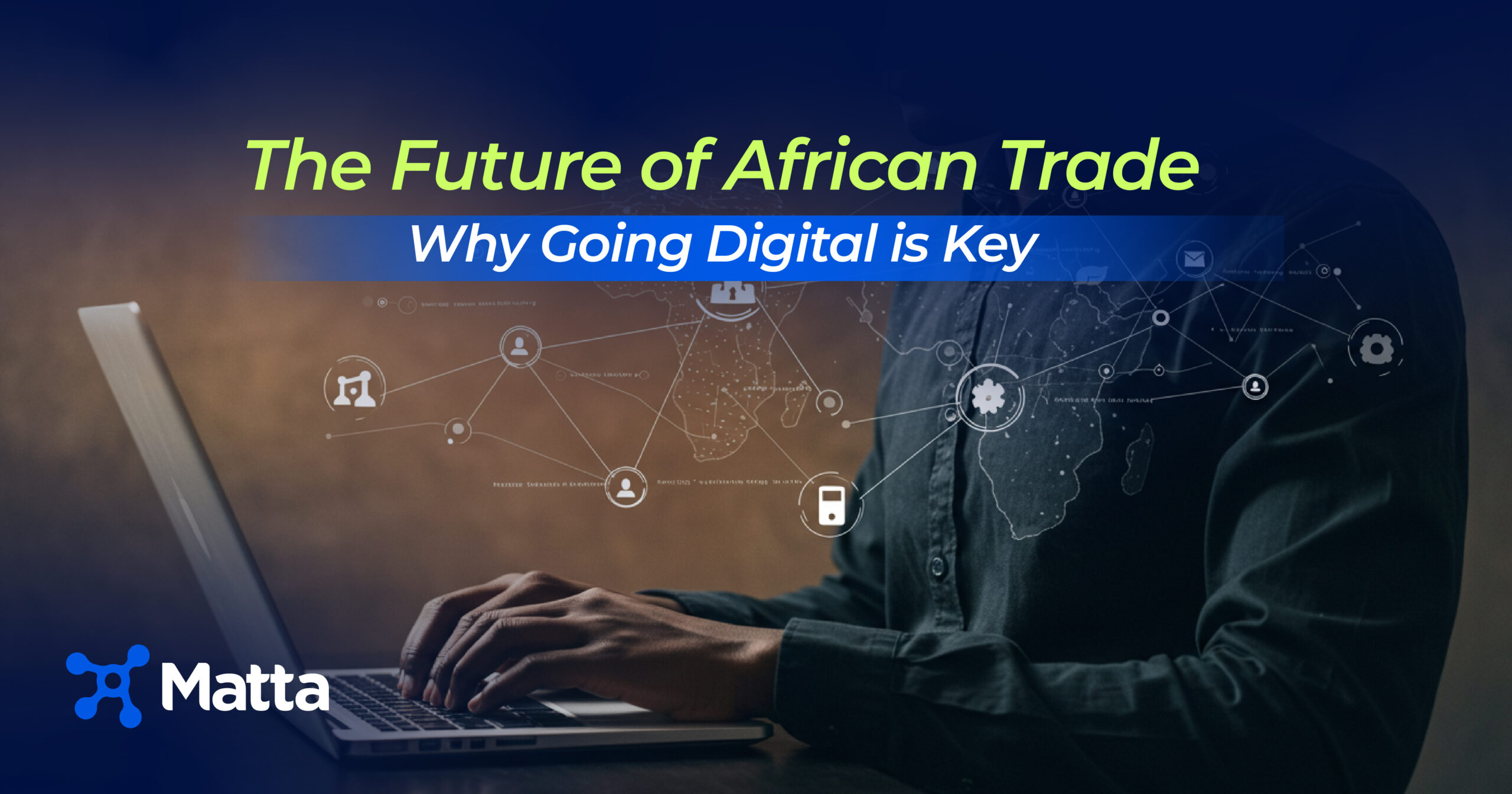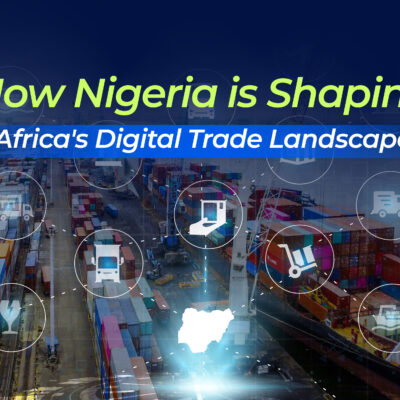
With technological advancements in recent decades, digital trade has emerged as a dynamic force in the global economy. These advancements have significantly streamlined international trade, ushering in the emergence of online platforms for trade, opening up opportunities for businesses and customers alike.
While Africa faces unique challenges in accessing global markets, digital technologies offer unprecedented opportunities to overcome these hurdles and unlock significant economic growth through increased intra-African trade.
With its youthful population and immense untapped potential, Africa stands at a critical juncture. With growing technology access, more people are embracing digital transformation.
This article explores the transformative impact of digital solutions on African trade, analysing how we can unlock avenues for growth and development.
We will examine how digital technologies can facilitate market access, improve efficiency, and enhance the competitiveness of African businesses, ultimately contributing to the achievement of Agenda 2063 and the Sustainable Development Goals. We will also look at the AfCFTA digital protocol as a framework to further develop Africa’s digital trade.

The Future of African Trade
Globally, the digital era has been marked by significant disruption. We’ve witnessed the rise of new companies, new ways of behaving and interacting, and the decline of established players who failed to adapt.
The fate of Blockbuster, Kodak, and even traditional taxi services is a cautionary tale for businesses that resist digital transformation. These examples underscore the importance of embracing technological advancements to remain competitive.
Digital trade solutions are born out of the evolving needs of customers and manufacturers alike. With humans adapting to easier communication, shopping, travelling, staying fit, and staying informed, it is only right to align and create trade solutions for traders on all levels.
To effectively maximise the power of digital trade solutions in Africa, it is essential to rethink business models and reimagine customer experiences.
Let’s take the impact of digital solutions on Africa’s agricultural sector as an example;

How can digital solutions impact African Agriculture?
The digital revolution is expected to transform African agriculture, offering significant potential to boost farm productivity due to farm management and data-driven decision-making, increase farmer incomes, and improve market access.
Several key areas will experience significant transformation, including:
- Farm Management: Farmers need real-time data on crop and soil conditions. With digital technologies such as ground sensors, remote sensing, and the like, farmers can collect granular information and optimise yields.
- Price transparency: Digital solutions facilitate price transparency and reduce reliance on intermediaries by connecting farmers directly with buyers across the continent and beyond.
Matta -Africa's premier chemtech solution- is doing this and many more to democratise the access to necessary raw materials and inputs across various sectors of the African economy.
- Improved market access: With digital solutions such as Matta, farmers don’t rely on local aggregators. They can get real-time data to decide when and where to sell their products.
Did you know that as an aggregator, you can be on your way to earning commissions when you sign up as a Matta agent?
- Improved transparency: Blockchain technology can increase supply chain transparency and traceability for stakeholders in Africa’s agricultural sector.
- Financial Inclusion: One of the core problems African farmers face is limited access to credit. Digital solutions like Matta– through its trade finance solution- are doing the most to ensure that African entrepreneurs involved in the CRIC (Chemicals, Raw materials, Ingredients, and Commodities) value chain have access to credit.
Did you know that Matta provides African manufacturers with tailored trade finance solutions?
- Streamlined supply chains: Digital solutions like Matta are crucial for enhancing agricultural supply chains and facilitating trade. By connecting private-sector suppliers with markets, these technologies improve access to inputs and create more efficient distribution networks.
These are just a few examples of how digital solutions can lead to economic growth. Beyond the agricultural sector, several other sectors of Africa’s emerging economy can immensely benefit from digital solutions.
However, the right frameworks must be set in place to guarantee the success of Africa’s digital economy.

Developing Africa’s digital economy
Africa’s digital economy is the sum of economic activities resulting from the billions of online connections among people, businesses, data, processes, and things. Digital economies are the backbone of modern economies and cover many activities.
Key components of a digital economy
- E-commerce: The buying and selling of goods and services online.7
- Digital platforms: Online marketplaces that connect buyers and sellers, such as Amazon, Matta, Alibaba, and eBay.
- Social media: Online platforms like Facebook and Twitter enable people to connect and share information.
- Digital content: Online content such as music, movies, and books.
- Digital services: Online services such as banking, healthcare, and education.
- Internet of Things (IoT): The network of connected devices that collect and exchange data.
- Artificial intelligence (AI): Using computers to perform tasks that typically require human intelligence.

Emerging opportunities in Africa’s digital economy
Africa’s digital economy has a lot of potential, some of which include;
- E-commerce: The African e-commerce market is projected to double over the next 5 years, reaching $113 billion by 2029. This shows a huge opportunity for businesses to explore.
- Fintech: Led By South Africa, Nigeria, Egypt, and Kenya, Africa’s fintech market is projected to grow thirteen-fold to US$65 billion in 2030. This means that despite the current boom, there is still room for growth in mobile money penetration.
- Agri-tech: In 2023 alone, agri-tech startups across the continent raised a staggering $864 million. This impressive figure indicates the sector’s burgeoning potential and the growing recognition of its critical role in Africa’s future.
- Chem-tech: With digitisation taking hold in Africa and the increased demand for specialty chemicals, there is an opportunity to connect Africa’s chemical industry via Chemtech Solutions.
Matta is a good example of how technology can impact Africa's chemical industry, better supply chains, and drive B2B success in chemicals.

What is Needed to unlock the potential of Africa’s Digital Economy?
The digital economy is more than just computers replacing manual tasks. It’s about leveraging technology to execute tasks better, faster, and differently.
It’s about innovation, disruption, and creating new value chains. Creating frameworks that consistently support Africa’s digital economy is crucial to do this.
For digital economies to thrive, multiple key elements are needed, including:
- Infrastructure: A robust digital infrastructure, including high-speed internet access, reliable mobile networks, and secure data centers.13
- Skills: A workforce with the digital skills needed to participate in the digital economy.
- Digital Trust: A secure and trustworthy online environment that protects consumers and businesses from fraud and cybercrime.
- Regulation: Regulatory framework (at the central and regional levels) that supports innovation while protecting consumers and promoting competition.
- Access: Affordable and equitable access to digital technologies for all members of society.

The AfCFTA Digital protocol
According to the International Institute of Sustainable Development, the AfCFTA Digital protocol is a comprehensive framework for facilitating African digital trade.
While still under development and not yet fully finalised, the Protocol aims to facilitate and boost intra-African trade by addressing the digital economy aspects of the African Continental Free Trade Area agreement.
The agreement, approved in February 2024, has 52 articles divided into 11 parts. Each part addresses different aspects of digital trade and administrative issues.
Its key components and anticipated implications include:
Components and provisions in AFCFTA’s digital protocol;
- E-commerce facilitation: The protocol includes provisions for harmonising regulations related to online transactions, consumer protection, and cross-border payments. The goal is to create a seamless environment for African e-commerce.
- Digital trade facilitation: This protocol encompasses broader digital aspects of trade beyond e-commerce, such as electronic documentation, customs procedures, and logistics. It is expected to promote digital solutions to streamline these processes.
- Data flows and privacy: The protocol will address cross-border data flows, balancing the need for data sharing to support trade and protect personal data and privacy. This may involve establishing regional data protection standards or frameworks.
- Cybersecurity: The protocol is expected to include provisions for cooperation on cybersecurity matters, including information sharing and capacity building, as it recognises the importance of secure digital transactions.
- Intellectual property rights: The protocol is likely to address the protection of intellectual property in the digital environment, which is crucial for fostering innovation and creativity.
The AfCFTA protocol is a crucial step towards reducing barriers to digital trade and increasing the volume of intra-African trade.

Benefits of digital trade in Africa
In Line with the African Union’s DIGITAL TRANSFORMATION STRATEGY FOR AFRICA (2020-2030), the digitalisation of trade in Africa will create growth opportunities and foster more inclusive economies. Some benefits of digital trade in Africa include;
Increased Market Access
Digital marketplaces like Matta have designed an online CRIC marketplace for African businesses. Digital platforms such as these give African companies unprecedented access to other African and global markets, connecting consumers and suppliers worldwide.
Intra-African Trade Potential
By facilitating easier information exchange and connecting businesses within the continent, digital trade solutions can significantly boost Intra-African trade and contribute to the success of the African Continental Free Trade Area (AfCFTA)
Streamlined trade processes
Digital technologies can make otherwise cumbersome trade processes easier through digital payment systems, electronic customs clearance, and other solutions that minimise paperwork, reduce border delays, and enhance transparency and efficiency.
Operational Enhancements
African businesses are continuously leveraging digital tools to improve internal operations. This includes implementing inventory management systems, utilising logistics platforms, and streamlining procurement, to name a few.
Enhanced Competitiveness
With digital trade solutions, businesses can streamline operations, reduce costs, and improve efficiency. This improves competitiveness in both domestic and international markets.
Reduced trade costs
Digital technologies significantly reduce the impact of geographical distance and infrastructure constraints on trade. This is due to streamlined logistics, payments, and customs clearance processes.

Go Digital With Matta
In the current economic climate, small and medium-sized enterprises must remain competitive to keep their doors open. One of the ways they stand out from the competition is through digital trade solutions.
At Matta , we understand the importance of online trade platforms in enabling the trade of chemicals, raw materials, ingredients, and commodities. This is why we built Africa’s premier Chemtech solution for trading Chemicals, Raw materials, Ingredients, and commodities. Connecting buyers and sellers of the critical materials and commodities that keep production lines running.
Whether a buyer or seller, you can access the benefits of streamlined digital solutions built for African manufacturers.
Click here to sign up as a buyer on Matta.
Click here to sign up as a vendor on Matta:
ROUNDING UP
The digital transformation is about more than just adopting new technologies. It’s about rethinking business models, reimagining customer experiences, and creating new value propositions.
Africa’s digital transformation involves leveraging technology to achieve the impossible, improve performance, and drive growth. This transformation presents immense opportunities for African economies, allowing them to leapfrog traditional development models and unlock their full potential.
To realise this potential fully, businesses and governments across all sectors must embrace the power of digital solutions and commit to continuous innovation. This can only happen in an enabling environment with the right regulatory frameworks.
African countries stand to gain from digital trade solutions. These platforms empower businesses, particularly SMEs, to thrive in the global economy by streamlining operations, reducing costs, and improving efficiency. Continued investment in digital infrastructure and the development of robust digital trade ecosystems will be critical for unlocking the full potential of African trade and driving sustainable economic growth across the continent.
Thank you for reading.
Read other articles or follow us on our social media channels for more insightful content.

